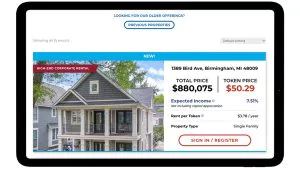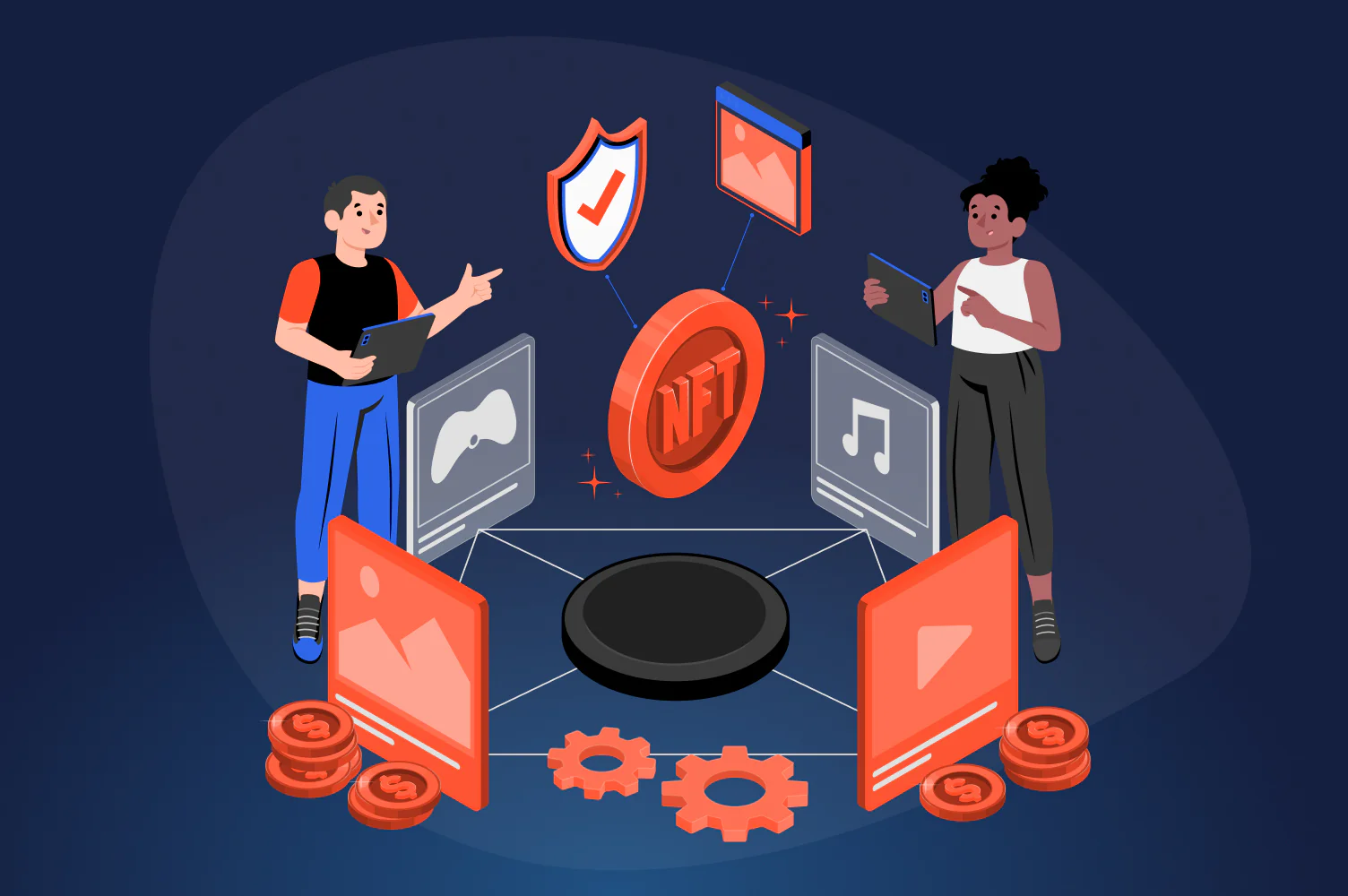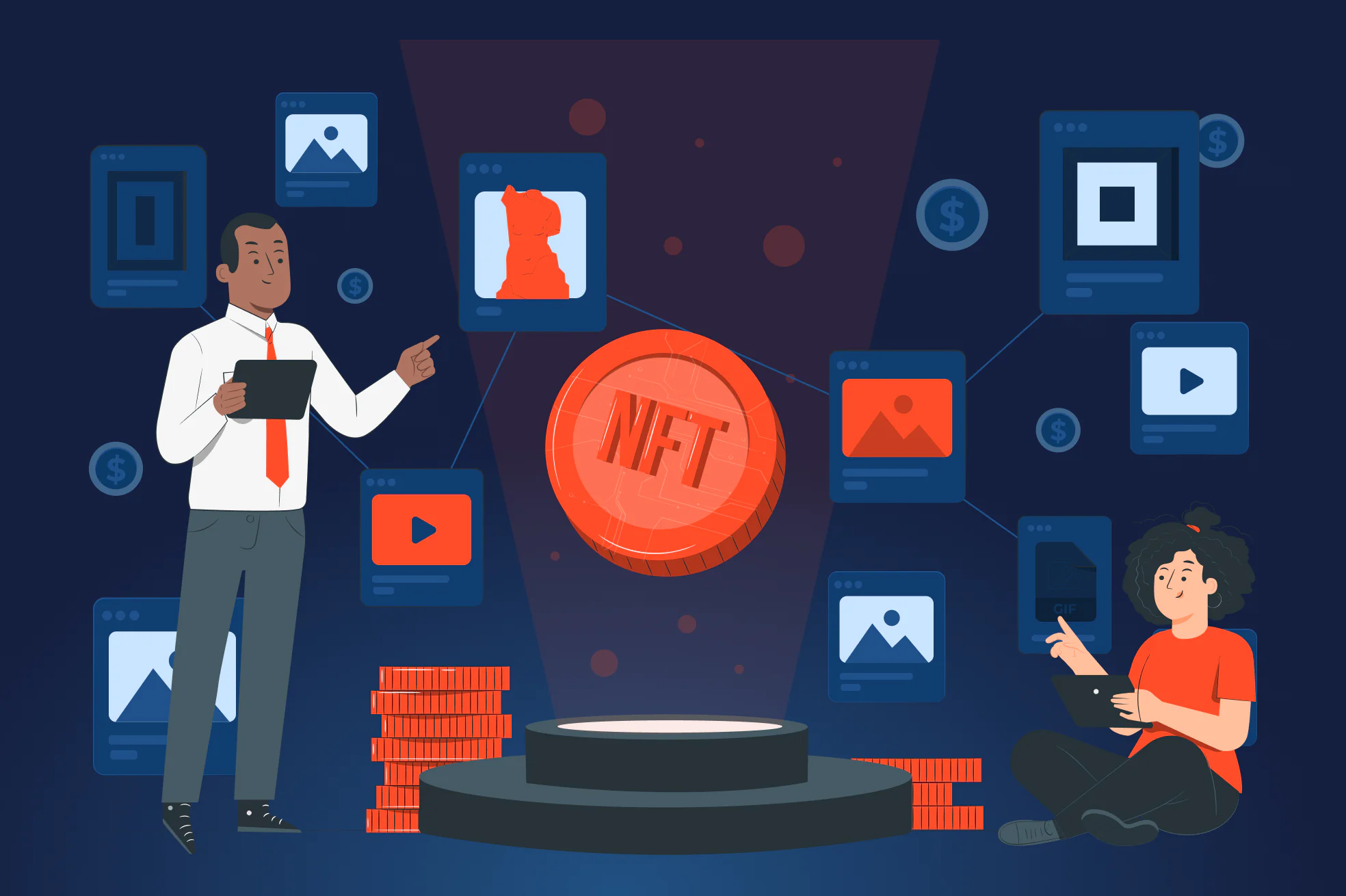Real estate business is one of the largest industries in the world that keeps growing over the years. MSCI reports that the global real estate market has grown to $10.5 trillion in 2020 despite all challenges caused by the COVID-19.
Still, the real estate industry has many dark spots and uncertainties, so people can’t be 100% sure that doing any property-related operations is transparent and secure enough. When a person invests in construction and development of property, they are unsure whether they will move into their new apartment on time or will have any real estate built for them at all.
Blockchain technology for real estate changes that. It helps to build trust between stakeholders by providing a complete transparency of all transactions.
Moreover, blockchain is a key to saving time and money, as it automates various processes like tenant background screening, contract signing, tax payments and such. The global tokenization market is expected to grow up to $4.8 billion by 2025, and the property business is one of the most common industries where blockchain solutions can help a lot.
Nevertheless, blockchain in real estate is not a technology you can easily understand. We all hear that blockchain is revolutionary technology, but what does it have to do with real estate? You need to know exactly what new possibilities your property business will have when you decide to develop a product for real estate that involves blockchain.
JatApp has worked on more than 200 projects, including solutions for blockchain and real estate industry, so we know why property businesses are looking to implement blockchain technology and what they are expecting from it. In this article, we will explain what real estate blockchain is and describe the most common examples of blockchain real estate companies.
What is blockchain in real estate?
Before we discuss how blockchain can help real estate business, it’s reasonable to understand how blockchain technology works in general. Imagine you have a diary, in which you write down how much money you lend to your friends. However, they can secretly take your diary and erase your notes or change the amount they owe you. No doubt, this way of keeping a record of your transactions is insecure.
And now imagine that you get a magic notebook that encrypts each entry with a code made of random symbols. Every single time you write down a new note, it encrypts the previous code once again and adds new symbols. Nobody can decipher and change any note without breaking the code of all notes. At the same time, all your friends have a copy of the magic notebook, so everyone will see any changes.
Blockchain works in the same way. Each transaction is encrypted with random symbols called hash. With every activity that follows, the new hash is generated from the previous block of symbols, thereby creating a chain of blocks with encrypted data. As a result, no one can interfere with this chain without being unnoticed.
In the context of real estate business, blockchain can provide many benefits such as:
- Tokenization of real estate. For example, by using Ethereum blockchain technology you can create digital identities of any real estate asset called tokens. Users, who have such tokens, can control and monitor the ownership rights, transparency of transactions, regulations compliance, and so on.
- Process efficiency. Blockchain can help with automating various processes. Automated tax payments, rent collection, dividend payouts, and ownership rights transition can be performed without even meeting stakeholders in person.
- Reduced costs. Once blockchain connects all stakeholders and automates many processes, involvement of a third party to perform a transaction is not necessary any longer. For example, you don’t have to pay brokerage fees and bank interest because you sell property directly to a customer via blockchain.
- Expanded partner and customer base. On the basis of blockchain technology, it’s possible to create a feature that automatically restricts all actions non-compliant with the law regulating real estate business. In such a way, you can attract more foreign partners and clients, who will not have to bother themselves with learning about local property business policies. They can perform transactions just like local customers.
- Access to larger investor pools. Blockchain makes investing in real estate more accessible. A property asset can be divided into multiple pieces, so users with limited budgets can make small investments and will surely get their profit as soon as the property is sold or rented.
Ways to use blockchain in real estate business
Blockchain in real estate is rapidly developing, so new solutions constantly appear on the market. However, there are several domains, where blockchain technology has already proved its effectiveness, and the demand on such products is higher than ever. Let’s take a look at the most common examples.
Smart contracts
Investing your money in real estate can be a risky decision. There is no guarantee that you will get any returns when the property is sold or rented. Moreover, if you, for instance, invest in a construction project, the property development process may not even start and fraudsters disappear with all the money.
With a blockchain-based technology called smart contract, such cases are impossible. A smart contract performs actions necessary for meeting agreement terms automatically. It can’t be controlled by any party, and all actions are irreversible. As a result, property investment activities performed within a blockchain network are reliable, as all shareholders automatically get their payouts when the asset starts delivering returns on investment.
How smart contracts work
Also, smart contracts create an opportunity for the real estate investment platforms to attract more investors with different levels of income. In a blockchain network, any asset can be divided amongst as many investors as possible, so people can spend some little sums on funding real estate.
In addition, gathering investments in tiny sums is much faster because investors perceive funding the property with a small amount of money as a less risky decision.
RealT, Republic, and VairT are the startups that can make a good example of platforms that offer blockchain real estate investment. A customer just needs to visit a platform’s website, choose a property they would like to invest in, create an account, and purchase tokens representing their investment in a chosen asset.
RealT investment platform
Secure transactions
By the same token (no pun intended), smart contracts allow to make all property-related transactions secure. Such startups as SafeWire, PropertyClub, and SMARTRealty present examples of a blockchain for real estate transactions. They offer a marketplace, where users can buy, sell, mortgage, and rent property with the use of smart contracts.
PropertyClub marketplace
Property management
Property management software is also rapidly developing technology in the real estate business. Globe Newswire reports that its market reached $1.51 billion in 2020 and will keep increasing at a CAGR of 5.6% within the next 6 years.
Powering your property management solution with blockchain technology can give you a visible competitive advantage. With blockchain, such property management tasks as rent collection, credit history checks, and maintenance works planning become more transparent and secure. ManageGo is a valid example of the blockchain integration in property management software.
ManageGo rent collection feature
Home sharing
This case is simple as a pie. With the help of a blockchain, you can create a home-sharing platform similar to Airbnb, but users are charged with cryptocurrency instead.
Dtravel is an on-point example. The service enables users to rent an apartment directly from the owner. The company follows a marketplace business model, so it provides a platform, which connects homeowners and renters.
Dtravel charges a fee from every transaction to make profit. Since the platform positions itself as a decentralized community of property owners, it lets homeowners earn extra money by participating in the support and development of the startup.
Dtravel marketplace
Property construction and development
As we’ve already covered, smart contracts automate compliance with agreement terms. So, this feature can be used in property construction and development, when each party feels uncertain about whether a project will be successfully finished. Large construction projects often lack transparency, so a risk of budget overheads, delays, or fraud operations within a supply chain is always high.
Blockchain can simplify procurement and supply chain management by assigning irreplaceable tokens to each unit of resources necessary for the construction. It’s impossible to manipulate their amount or price for the purpose of fraud.
For instance, a subcontractor cannot change the number of water pipes needed for the building without proving to all stakeholders that ordering extra pipes is really necessary. In the same way, blockchain can help project managers to observe a project progress in real time and openly share the updates with all stakeholders.
BuildSort is a perfect example of how blockchain technology can be used in property construction and development. The startup presents a software platform that uses blockchain to compile project progress data, create smart contracts with contractors and suppliers, manage payments, and present instant 3D visualization of a property under development.
BuildSort user interface
Conclusion
Blockchain in real estate can do many things that you will definitely find helpful. In general, blockchain technology helps property businesses to avoid such things as shadow transactions, manual paperwork, and extra expenses. Nonetheless, blockchain technology is designed to be complex for purpose, so development of relatable solutions is not that easy.
If you need your own blockchain product for real estate, professional assistance of tech professionals will be necessary. With 6 years of experience in development of real estate and blockchain projects, as well as 99% of customer satisfaction rate, JatApp can give you a helping hand.
Get in touch with us to discuss the details.









